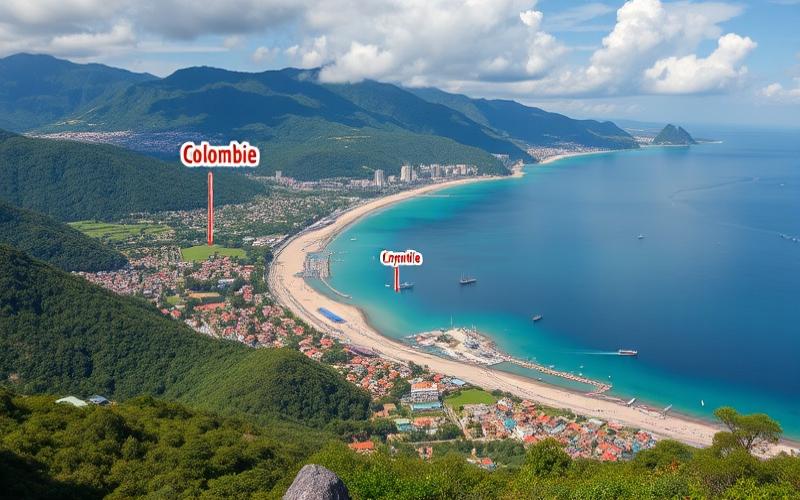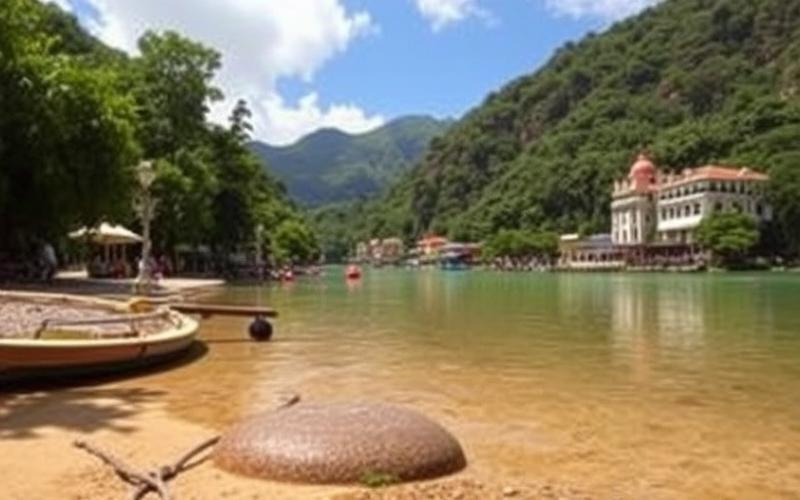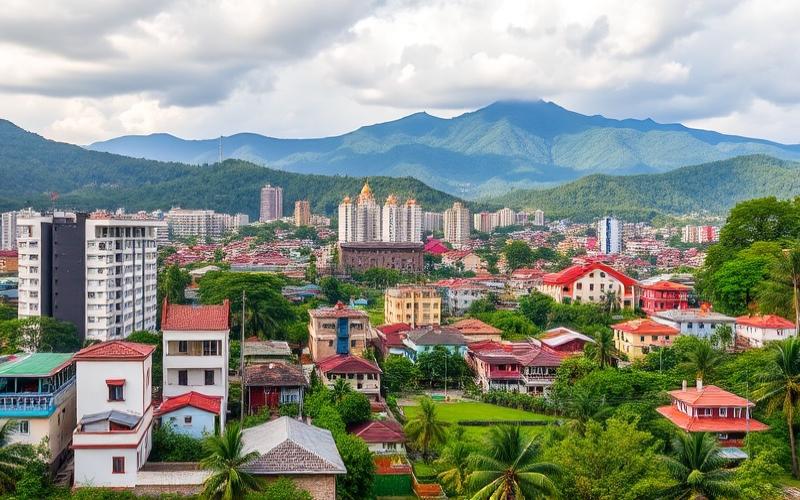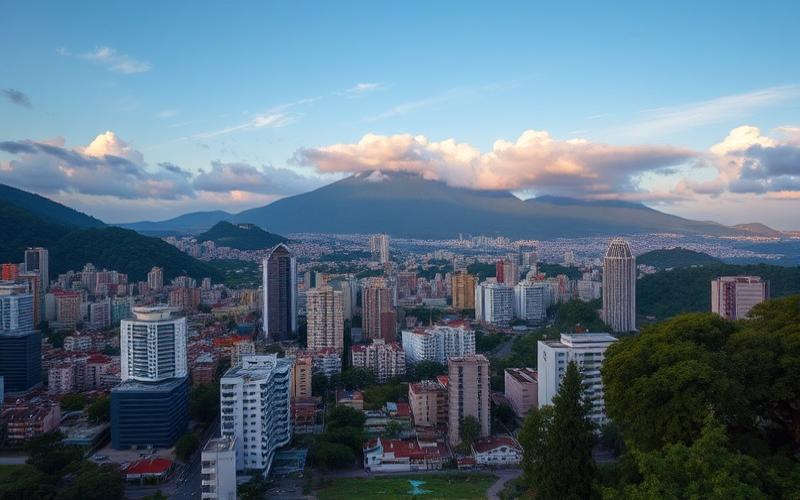
 Published on and written by Cyril Jarnias
Published on and written by Cyril Jarnias
Studying in Colombia means immersing yourself in a vibrant world where cultural richness and academic excellence intertwine.
Colombian universities not only offer diverse programs but also unique opportunities to delve into disciplines ranging from engineering to Latin American literature.
From the dynamic city of Bogotá to the sunny coasts of Cartagena, each destination provides an educational experience accompanied by personal discoveries and intercultural growth.
Not to mention, of course, the relatively affordable cost of living, which allows international students to fully enjoy their stay.
For those looking to combine studies and adventure, Colombia stands out as a top destination.
Higher Education Landscape for Expatriates in Colombia
Overview of Higher Education for Expatriates in Colombia
Top Universities Hosting International Students
| University | City | Features |
|---|---|---|
| Universidad Nacional de Colombia | Bogotá, Medellín, Manizales, etc. | Leading public institution, wide range of programs |
| Universidad de los Andes | Bogotá | Private university, highly reputable, dual degrees |
| Pontificia Universidad Javeriana | Bogotá, Cali | Excellent academic reputation |
| Universidad Externado de Colombia | Bogotá | Law, social sciences, international relations |
| Universidad de La Sabana | Chía | Foreign language programs, modern campus |
| Universidad EAN | Bogotá | Management and entrepreneurship programs |
Over 30 Colombian universities rank among the top 300 in South America and attract many foreign students.
Programs and Courses Available for Expatriates
- Wide range of disciplines: engineering, marketing, finance, health, social sciences, political science, anthropology, etc.
- English-language programs: offerings in English remain limited, but some universities like Los Andes, La Sabana, or EAN offer courses or tracks in English, especially at the master’s level or for exchange programs.
- French-language tracks: sixteen universities offer programs or modules in French, often through partnerships with French institutions.
- Dual degrees and mobility: over 90 dual degree programs and numerous cooperation agreements facilitate international exchanges.
Admission Process for International Students
- Admission procedure:
- Online application on the chosen university’s website.
- Application package including previous diplomas, official Spanish translation, motivation letter, sometimes letter(s) of recommendation.
- Proof of admission required for student visa application.
- Language requirements:
- Most programs are in Spanish: a proficiency certificate (DELE B2) is often required.
- For English-language programs, a TOEFL/IELTS score may be required.
- Degree recognition:
- Foreign diplomas must be translated and sometimes apostilled.
- France and Colombia have a mutual recognition agreement for university degrees, simplifying the process for French citizens.
Scholarships and Financial Aid for Expatriates
- Colombian government scholarships: open to foreign students for master’s, doctoral, or specialization programs, typically covering tuition fees, a monthly stipend, and health insurance.
- Institutional scholarships: some universities offer partial or full scholarships based on academic merit or study project.
- Mobility scholarships: through bilateral agreements or exchange programs.
Practical Considerations for Settling in Colombia as a Foreign Student
- Student visa:
- Issued for one year, renewable, requires enrollment in a program of at least 10 hours/week, proof of financial means, and admission letter.
- Simple procedure, cost around $40.
- Housing:
- University residences, shared apartments, apartment rentals (prices vary by city).
- Universities often provide assistance in finding housing.
- Cost of living:
- On average lower than in Europe or North America.
- Tuition fees between $6,000 and $15,000 per year.
- Support services:
- Welcome for international students, Spanish courses, administrative assistance, psychological services, sports and cultural activities.
Cultural Experiences and Expatriate Networks
- International student networks: campus associations, welcome groups, integration events.
- Cultural life: festivals, gastronomy, music, sports, discovering Colombia’s regional diversity.
- Expatriate communities: presence of French-speaking, European, and international networks, facilitating integration and experience sharing.
- Enriching experience: linguistic and cultural immersion, opportunity to travel through a country rich in landscapes and traditions.
Studying in Colombia offers a unique combination of academic quality, international openness, affordable cost of living, and immersive cultural experience.
Good to know:
Colombian universities like Universidad de los Andes and Pontificia Universidad Javeriana offer programs in English, with a cost of living generally lower than in many Western countries; international students often need to provide proof of Spanish proficiency and may benefit from specific scholarships.
Admission Process and Recognition of International Degrees in Colombia
Legal and Administrative Framework
The admission of international students to higher education institutions in Colombia is governed by the National Ministry of Education, which sets general requirements, but each university may establish specific criteria.
Steps to Submit an Application
- Verify the equivalence of the access diploma (baccalaureate or equivalent) and, if necessary, initiate the legalization procedure with the Ministry of Education.
- Gather the documents required by the institution (transcripts, diplomas, motivation letter, ID copy, etc.).
- Take, depending on the university, admission tests or interviews. Some programs require specific tests (medicine, music, arts, etc.).
- Provide proof of admission to apply for a student visa.
- Submit the student visa application with all supporting documents (see table below).
- Provide proof of financial solvency for the duration of studies.
Table of Documents Generally Required for the Student Visa
| Document | Detail/Note |
|---|---|
| Valid passport | At least 180 days validity, two blank pages |
| Admission letter | Issued by the Colombian institution |
| Proof of financial solvency | Bank certificate or bank statements from the last 6 months |
| ID photo | 3×4 cm format, white background, jpg file max 300 kb |
| Parental authorization (minors) | Authenticated by notary or Colombian consulate |
| Proof of university enrollment | Signed form |
| Certificate of legal existence of the university | Official document |
Language Requirements and Standardized Tests
- Proficiency in Spanish is essential. Some institutions require certification (e.g., DELE from the Cervantes Institute).
- For some programs, aptitude tests or interviews are required.
- Some universities accept scores from international tests (IB, SAT, ACT, French baccalaureate, etc.) for direct admission.
Deadlines to Respect
Admission procedures take place several months before the start of the academic year. Dates vary by university, but it is advisable to begin the process 6 to 12 months in advance.
The student visa application must be submitted as soon as the admission letter is obtained and early enough to avoid any delays at the start of the academic year.
Procedures for Recognition of International Degrees
- The legalization or validation of the access diploma (baccalaureate or bachelor’s degree) is done with the Colombian Ministry of Education.
- Some bilateral or multilateral agreements facilitate this recognition, particularly for European degrees (e.g., France, Germany), the International Baccalaureate (IB), or other recognized systems.
- Diplomas sometimes must be accompanied by an official translation into Spanish.
Colombian Bodies Responsible for Evaluation and Accreditation
- National Ministry of Education: evaluation and legalization of foreign diplomas.
- University institutions: final validation for enrollment.
Common Challenges Faced by International Students
- Administrative delays for diploma legalization and translation.
- Lack of clear information on specific requirements of each university.
- Difficulties related to proof of financial solvency.
- Language barrier for non-Spanish speakers.
- Complexity of the visa procedure and risk of delays.
Practical Tips
- Start the process as early as possible (1 year before the desired start date).
- Contact the international admissions office of the chosen university directly to clarify criteria and obtain the updated list of required documents.
- Anticipate the translation and legalization of diplomas with the competent authorities.
- Prepare a solid financial file (bank statements, guarantees).
- Inquire about possible scholarships or financial aid available.
- Look into language preparation courses if necessary.
- Check possibilities for extending stay and rules regarding visas (especially for stays under 6 months or exchanges).
Good to know:
International students must submit their application before the deadline, check the specific language requirements of each institution, and ensure their foreign diplomas are recognized by the Colombian Ministry of Education via Icfes, taking into account agreements like the Bologna Process for European degrees.
Scholarships and Funding for Expatriates in Colombia
Types of Scholarships Available for Expatriate Students in Colombia
Government Scholarships (ICETEX)
- Full tuition fee exemption
- Monthly stipend equivalent to three legal minimum wages
- Comprehensive medical assistance (hospital care and repatriation)
- One-time installation allowance
- Contribution for books and academic materials
- Coverage of visa and foreigner ID card fees
- Intensive Spanish courses for non-Spanish speakers
University Scholarships
- Some Colombian universities offer their own scholarships, often for top-performing international students or based on social criteria
- Tuition fee reduction, housing, or other benefits
Scholarships from International Organizations
- Organizations such as the Organization of American States (OAS), the Inter-American Development Bank, or international NGOs may offer targeted scholarships (usually for master’s or doctoral programs)
- Partial or full support depending on the program
Common Eligibility Criteria
- Be a foreign citizen, without Colombian nationality
- Not reside in Colombia at the time of application nor have resided there in the last 6 months
- Not have been a beneficiary of the same program before
- Be under 50 years old
- Hold a bachelor’s degree (or equivalent) with a GPA of at least 4.0/5.0 according to the Colombian system
- Definitive admission to a Colombian higher education institution
- Motivation letter and prioritization of programs
- Submission of academic documents (certified diploma, transcripts, admission letter)
Application Process
- Online submission via the official ICETEX platform or the relevant university’s website
- Upload of required documents (admission letter, diplomas, transcripts, motivation letter)
- Evaluation of applications and publication of results on the official website
- Obtaining the admission letter and instructions for the student visa
Other Funding Options
Student Loans
ICETEX also offers educational loans, accessible to some foreign students under conditions
On-Campus Jobs
Some Colombian universities offer student employment opportunities, usually part-time in libraries, laboratories, or administrative services
Paid Internships
Opportunity to undertake academic internships in partner companies or research laboratories, often paid
Practical Tips to Maximize Chances of Obtaining Funding
- Prepare a strong academic file with a high GPA and recommendations
- Write a personalized motivation letter, demonstrating the impact of the study project on personal and professional development
- Prioritize programs based on relevance and admission chances
- Strictly respect application deadlines
- Search and apply for multiple scholarships simultaneously
- Use official platforms and regularly check scholarship announcements
Useful Platforms and Resources
| Platform | Type of Information | Available Language |
|---|---|---|
| ICETEX | Government scholarships, loans | Spanish |
| EduCanada | International scholarships | French, English |
| Mina7 Portal | Study scholarships in Colombia | French, English |
| Universities | Own scholarships, campus jobs | Spanish, sometimes English |
Examples of useful links:
- https://web.icetex.gov.co/becas/beca.colombia-extranjeros
- https://www.educanada.ca/scholarships-bourses/non_can/index.aspx?lang=fra
- https://mina7portal.com/opportunit%C3%A9s/bourse-detude-en-colombie/programme-premier-cycle
Testimonials from International Students
“Thanks to the ICETEX scholarship, I was able to cover all my tuition and living expenses. The intensive Spanish courses allowed me to integrate quickly, and the monthly stipend was sufficient to live in Bogotá. I was also able to complete a paid internship at a company partnered with the university, which enriched my professional experience.”
“I obtained a university scholarship that covered half of my tuition fees. For the rest, I worked at the campus library and found a paid internship in a research laboratory. The diversity of funding options in Colombia is a real asset for international students.”
Key takeaway:
To maximize your chances, prepare your application in advance, target multiple funding sources, and regularly consult official platforms for new opportunities.
Good to know:
Scholarships offered in Colombia include government options like Colfuturo, as well as university and international allocations, often accessible by applying through platforms like Scholarship Portal; maximize your chances by carefully preparing your application and exploring on-campus work opportunities.
Impact of International Education on Expatriates’ Careers
Students who have completed an academic stay in Colombia develop intercultural skills particularly sought after in the global job market. Immersion in a multicultural society and attendance at international schools enable the acquisition of:
- Adaptability to varied and complex environments
- Mastery of local cultural codes and the ability to navigate between different social and professional norms
- An open-minded attitude and increased tolerance, thanks to exposure to diverse perspectives
- Skills in conflict resolution and intercultural communication, useful in international teams
Learning Spanish in Colombia significantly enriches professional opportunities:
- Spanish is the fourth most spoken language in the world, providing access to growing markets in Latin America, Spain, and the United States
- International companies value Spanish-English bilingualism, particularly in sectors like finance, international trade, tourism, NGOs, and education
Alumni Testimonials
“After my master’s in Bogotá, I joined a technology company based in Medellín. Understanding local cultural dynamics allowed me to lead regional projects.”
“My experience at an international school in Cali gave me access to an alumni network, facilitating my integration into a multinational company in Madrid.”
“Thanks to the Spanish I learned during my stay, I was able to secure a project management position in an NGO operating between Colombia and Mexico.”
Sectors in Colombia Benefiting from the Influence of Alumni Who Studied in the Country
| Sector | Examples of Impact from International Alumni |
|---|---|
| Technology / IT | Startup creation, development of multilingual services |
| Energy and Mining | Management of transnational projects, technical expertise |
| International Trade | Development of subsidiaries and strategic alliances |
| Tourism and Hospitality | Market opening and international attractiveness |
| Education | Pedagogical innovation, international academic exchanges |
| NGOs and Sustainable Development | Regional cooperation, management of intercultural programs |
Statistics on Employability of Expatriates After Studying in Colombia
- Over 85% of international graduates find employment within 6 to 12 months after completing their studies, in Colombia or internationally
- Alumni who developed bilingual skills (Spanish-English) benefit from a salary premium of 10 to 25% compared to their monolingual peers
- Colombian and international employers consider academic experience in Colombia as a differentiating asset for positions with an international dimension
Economic and Sectoral Differences: Colombia vs Other Study Destinations
| Criterion | Colombia | Other Destinations (Canada, Europe, USA) |
|---|---|---|
| Economic Fabric | Emerging market, strong regional growth | Mature market, increased technological innovation |
| Leading Sectors | Energy, agriculture, IT, commerce, tourism | Finance, health, engineering, research |
| Networking | Strong local and regional anchoring | Diversified global networks |
| Language | Spanish, English in international schools | English, French, German, etc. |
| Cultural Integration | Strong Latin American immersion | Global diversity, but sometimes closed communities |
Tips to Maximize the Impact of an Educational Experience in Colombia on an International Career
- Get involved in local and international projects to expand your network
- Highlight acquired intercultural and linguistic skills on your resume
- Join alumni associations and professional networks
- Target growing sectors where knowledge of the Latin American context is an asset
- Stay informed about professional mobility opportunities between Colombia and other world regions
The educational experience in Colombia is not just academic training: it constitutes a strategic lever for an international career, combining competence, network, and openness.
Good to know:
Intercultural skills and Spanish language learning, acquired during studies in Colombia, significantly enhance employment prospects in sectors like energy and technology in Colombia, but also internationally; alumni attest to successful integration into local companies and an employability rate of 85% within six months of graduation.
Disclaimer: The information provided on this website is for informational purposes only and does not constitute financial, legal, or professional advice. We encourage you to consult qualified experts before making any investment, real estate, or expatriation decisions. Although we strive to maintain up-to-date and accurate information, we do not guarantee the completeness, accuracy, or timeliness of the proposed content. As investment and expatriation involve risks, we disclaim any liability for potential losses or damages arising from the use of this site. Your use of this site confirms your acceptance of these terms and your understanding of the associated risks.























